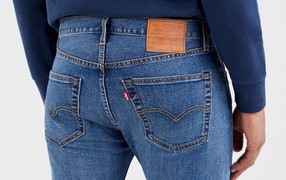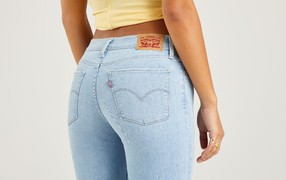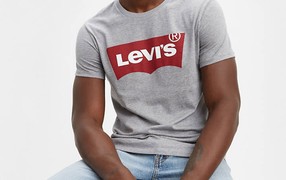Breadcrumbs navigation
Sustainability

As we all know, climate change has reached a key stage. And while it may seem catastrophic, we still have time to do a lot to protect our planet. That's why Levi’s® is more than ever committed to protecting a healthy environment through sustainable manufacturing and sales practices. In the new season, it continues its sustainability initiatives for the vast majority of its products.
"We take sustainability and responsible consumption seriously and they are a priority when creating our collections. In everything we do, we focus on quality and, wherever possible, we promote sustainability, including material and process innovations such as the use of cotton hemp and Water <Less® water-saving technologies or our upcycling programs such as Levi's® SecondHand and Levi's® Authorized Vintage. We want people to buy what they love, live in it and enjoy it for as long as possible, ”says Karyn Hillman, CEO of Levi Strauss & Co.
The nature-inspired Spring / Summer ’21 collection, entitled “Second Nature,” combines a freer, more practical outdoor style, currently prevalent in the streets and catwalks, with a range of more sustainable materials and practices. It uses sustainable materials, including organic cotton, cotton hemp and sustainably produced fine Tencel™fiber, which reduce waste and water and energy consumption. Recycling is gaining prominence through the wider use of recycled and recyclable materials where recycling programs and technologies exist, as part of our efforts to expand the range of circular products and processes. And as always, Levi’s® Wellthread is a leader in more sustainable innovation, thanks to the use of 55% hemp material and new natural dyeing techniques. Overall, it is a combination of strategies that help move towards a more sustainable future.
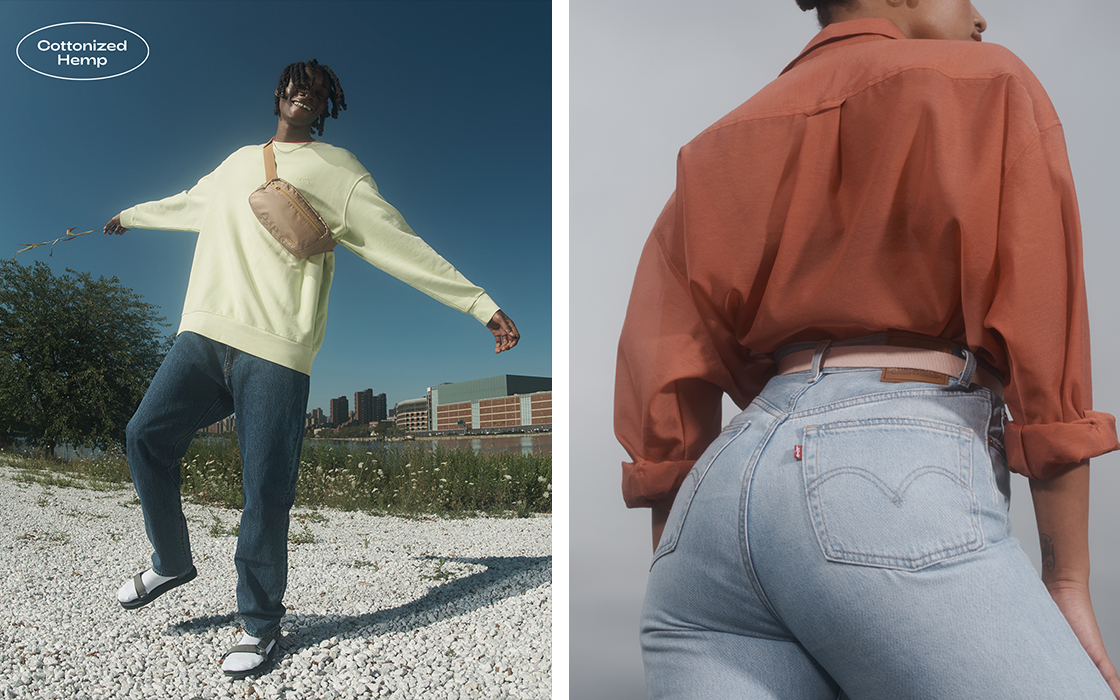
ORGANIC COTTON
In the spring / summer 2021 season, a range of men's clothing is made from certified organic cotton, which is grown without chemical pesticides. It contributes to healthier and cleaner soils, as well as cleaner watercourses. When the soil is healthier, it is fertile for longer. It saves both land and water, and creates healthier land that supports stronger and economically and ecologically sustainable farming communities.
Levi's® is expanding its range this season with 501® ’93 Straight retro jeans, inspired by the 1993 501® cut, made from organic cotton. You can also find here in a series of denim and non-denim pieces Stay Loose Pleated, which is a new cut this season on the Stay Loose platform. He still has a loose leg cut, but also loose waist. Last but not least, you will find organic cotton in other popular men's models, such as 501® Original, 502™ Taper, 511™ Slim, 514™ Straight and 527™ Bootcut jeans.
COTTON HEMP
In the last few seasons, we have been innovating our fiber and fabric processes to make them even more environmentally sustainable. In 2019, we were the first on the market to introduce Levi’s® Wellthread™, the first collection using cotton hemp. Hemp is a crop that requires less water and pesticides than commonly grown cotton. Hemp fiber has never been a popular clothing material due to its roughness. That's why Levi’s® and experts have developed an innovative "cotton" process that makes hemp yarn as soft and comfortable to the touch as cotton. Cotton hemp is now a sustainable substitute for cotton.
Levi’s® also uses it this season. As trends continue to dominate the loose fit, cotton hemp can be found in the indigo products of the High Loose jeans line, whose high waist and wide trousers flatter the figure, as well as the new Loose Cargo trousers inspired by functional clothing with a looser fit. Cotton hemp is not limited to trousers. You will also find it in the brand new Surplus Utility Trucker jeans, Tailored Trucker Jacket and a whole range of practical T-shirts.
In the men's collection, you will find hemp from the Stay Loose line, popular loose-fitting jeans inspired by the 1990s, in all Levi's® 551®Z Authentic Straight products - a new cut inspired by the original 1961 Levi's® 551 zipped jeans, or in the new line straight or just very lightly tapering non-denim XX Straight Chino pants, which we all love. You will find cotton hemp across a range of western shirts and jean jacket in both men's and women's designs.
![]()
TENCEL™
A sustainable alternative to viscose - Tencel is a fine fiber derived from responsibly harvested wood. The use of fibers from sustainably managed forests, farms and plantations helps to preserve old forests with rich biodiversity. Fiber absorbs moisture better than cotton, is softer than silk and cooler than linen.
The soft and lightweight Tencel™ is used this season in a number of new loose cuts for women, such as Tailored High Loose jeans, which have the same high waist and wide trousers as the standard High Loose, but the soles at the waist give them a more adventurous silhouette. Tencel™ is also woven into Loose Straight jeans with a medium-high waist and straight trousers or High Loose Taper, carrot-cut jeans. With the arrival of warm weather, you will find Tencel™ in our new line of loose shorts High Loose Short and High Loose Bermuda, capturing a healthy dose of nostalgia of the 90s with an emphasis on sustainability.
The men's collection expands the increasingly popular XX Chino and Tencel™ line - you'll find it blended with organic cotton across a range of non-denim trousers, including the new XX Stay Loose Pleated Chino and XX Stay Loose Pleated Chino Short, as well as the new XX Chino Slim Taper colors. Tencel™ is also blended into Stay Loose denim as well as skinny, slim and taper cuts such as 510™ Skinny, 511™ Slim and 502® Taper. Last but not least, you will find Tencel™ for shorts and knit tops, including Cubano Shirts with a scarf print or Utility Short shorts.
RECYCLED MATERIALS
Recycled materials increase fashion sustainability by creating clothing from waste that would otherwise end up in landfills. It also significantly saves the resources needed for cotton growing and polyester production. For the Fall / Winter 2020 season, Levi's® offers a wide selection of recycled materials that reduce our environmental footprint.
Our polyester comes in the form of Thermore®, Thermore® EcoDown®, Repreve® and recycled polyester. Thermore is a 50% recycled polyester material used in warm linings, while Thermore EcoDown is a 100% recycled fibrous alternative made from recycled PET bottles. Both materials can be found in Levi's® line of jeans and our expanding line of Levi’s® Puffers. These appear in various lengths, cuts and colors this season.
And then there's Repreve®, another version of polyester made from recycled plastic bottles that we use in Sherpa jean jackets, fleece sweatshirts and a wide range of our Levi's® L Pack backpacks. Finally, there is recycled polyester in Sherpa jean jackets and faux fur across the line.
Recycled materials are the key to sustainability, and we are increasingly incorporating them into Levi’s® clothing, accessories and footwear. This season, we make Sling Bags, large shopping or beach bags and Levi’s® backpacks from recycled polyester obtained from recycled plastic bottles and other plastic waste. We also make Levi’s® Beanies from recycled PET bottles spun into polyester yarn. And then there are Levi’s® sandals, such as Tahoe for men and Low Cadys Slide for women, also made from recycled materials and seaweed.
REPAIR & REIMAGINE
Whether you wear your favorite Levi's® jeans or breathe a second life into them by passing them on to someone else, Levi's® helps your customers reduce waste and extend the life of their denim pieces. We know that transforming the fashion industry will require much more than just using new, sustainable materials in the manufacture of clothing. The ultimate goal is a circular system in which quality and durable products designed from safe and high-quality materials and dyes can later be recycled and transformed into new products, reducing both the volume of waste and the demand for ever new raw materials. One of the steps is our increasing efforts to repair and reshape old clothes.
We design Levi’s® products to stand the test of time. However, if you wear them, you can bring your Levi's® pieces to Levi’s® Tailor Shop, where we will either repair them or transform them into something new.
We continue to work on the positive impact at each stage of the life cycle of our products and will continue to use the design and selection of fibers to minimize the negative impact on the environment as much as possible. We will continue to use water more efficiently, reduce carbon emissions and apply the Screened Chemistry program we have developed. We will continue to support the people who make our products through our Worker Well-being program.
We want not only to improve our own programs that have a positive impact on the environment, but also to inspire joint action on the most pressing social and environmental issues facing our business, industry and the planet. From making clothes to strengthening communities around the world, Levi’s® is committed to doing the right thing.
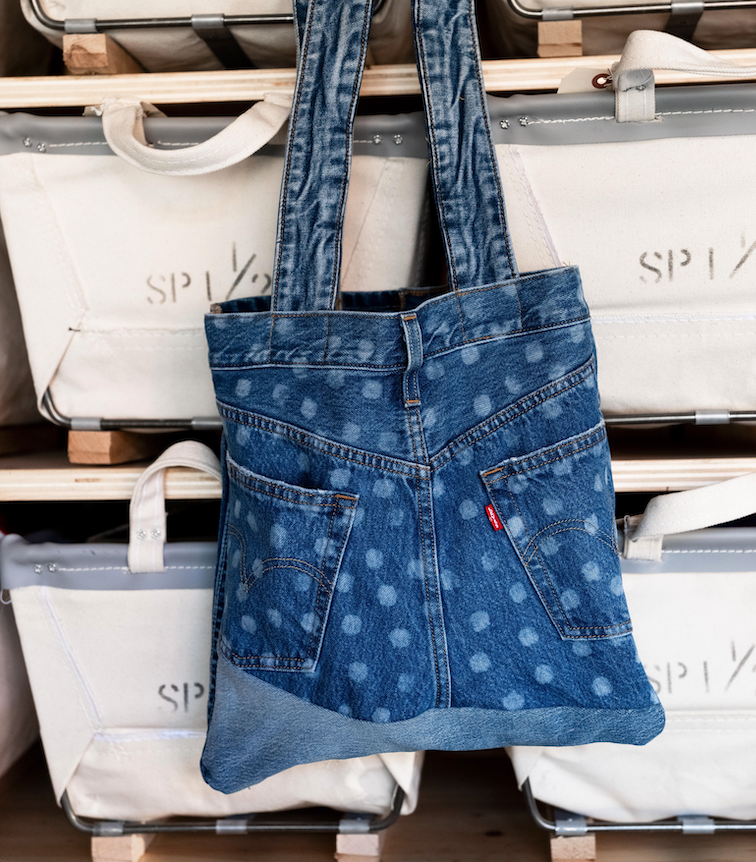
SUSTAINABLY SOFT
Thanks to the growing popularity of active rest and streetwear, comfort reigns supreme today. It is not enough that we look great in what we are wearing, we have to feel great in that as well. For the autumn / winter 2020 season, this means Sustainably Soft at Levi's®, a range of materials that are incredibly soft, but mainly made from sustainably harvested trees. These materials - including Tencel™ and EcoVero™ - represent the way forward for a more comfortable, sustainable and stylish future. Tencel™ + EcoVera™ are soft fibers obtained from responsibly harvested wood. The use of fibers from regeneration farms helps to protect mature forests that are essential to our ecosystem.
LEVI’S® WELLTHREAD™
Levi's® Wellthread ™ is traditionally our most sustainable collection. In the spring of 2019, cotton hemp was introduced and continues to preserve the basic principles of better, recyclable materials (where appropriate technology and infrastructure are available). It is manufactured in factories that operate in accordance with the Worker Well-being initiative of Levi Strauss & Co.
This season, for the first time, Levi’s® Wellthread uses cotton hemp non-denim trousers, specifically Taper Chino Levi's Wellthread. This hemp also appears in women's black Ribcage Wide Leg jeans, embroidered jeans and men's 502™ Taper jeans.
The Levi's® Fall / Winter 2020 collection shows that sustainability is much more than just a transient trend; it is woven into everything we do, and more and more of our customers demand it. We will therefore continue to strive for a positive impact at every stage of our activities, and we will continue to use the design and selection of fibers to minimize the impact on the environment. We will continue to save as much water as possible, manage and reduce CO2 emissions, and apply our Screened Chemistry program to suppliers. Through our Worker Well-being programs, we will continue to support the people who make our products. We not only want to improve our own programs that have a positive impact on the environment, but also to inspire joint action on the most pressing social and environmental issues facing our business, industry and the planet. We are determined to act responsibly and correctly, from how we make clothing to strengthening communities around the world.
